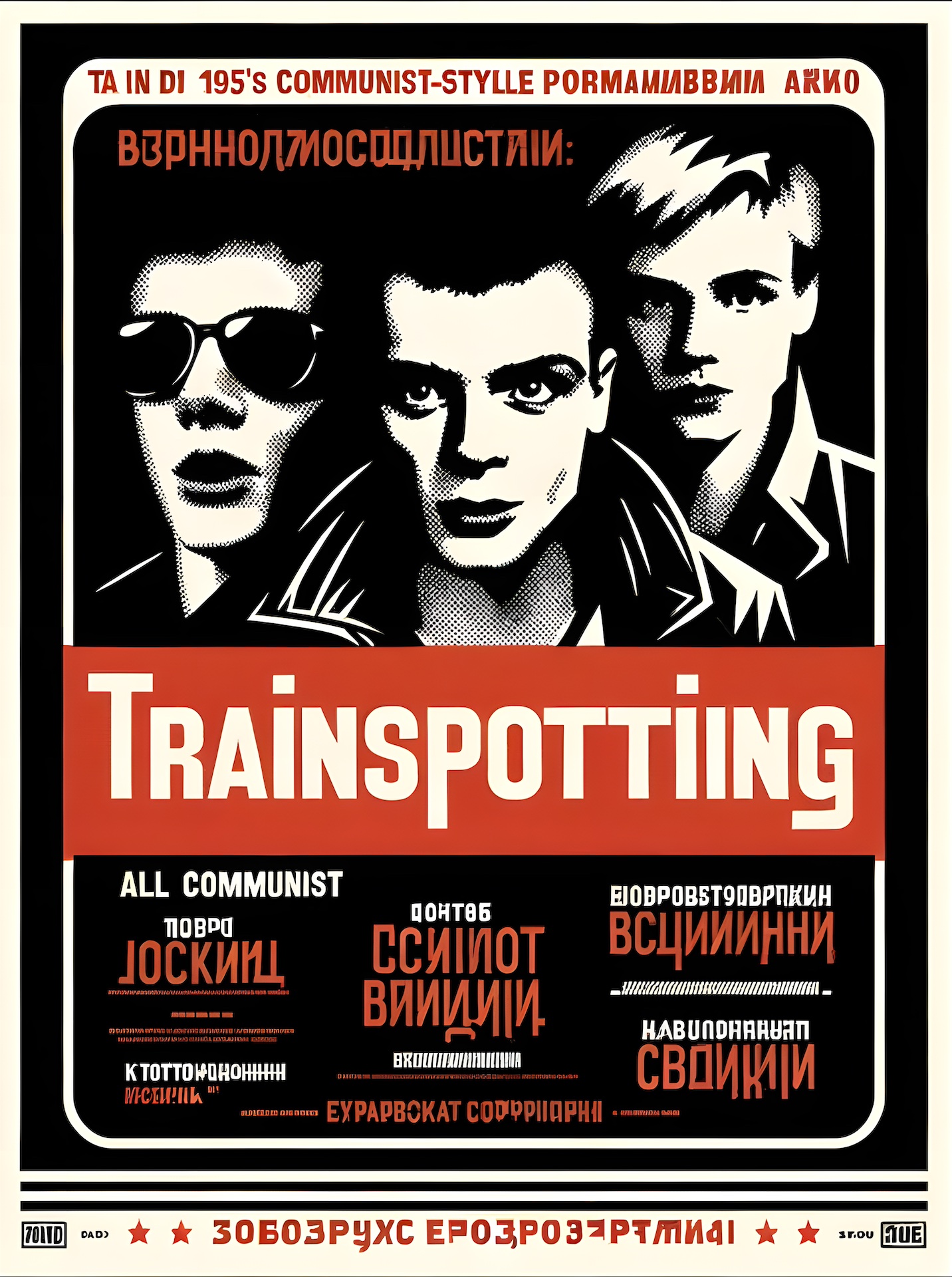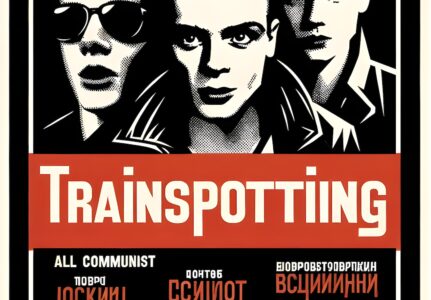In the underbelly of Edinburgh’s dark and gritty streets, where despair and addiction grip the lives of its inhabitants, a novel emerged in 1993 that would shock, captivate, and leave an indelible mark on literature and popular culture. “Trainspotting” by Irvine Welsh, a provocative and unflinching portrayal of addiction, poverty, and survival, has been a powerful force in contemporary literature. In this comprehensive exploration, we’ll delve into the plot, key characters, themes, inspiration behind the book, reviews, cultural impact, similar books, other works by Irvine Welsh, and its enduring presence in popular culture.
Plot: Navigating the Depths of Addiction
“Trainspotting” is a visceral and unapologetic exploration of the lives of a group of friends in Edinburgh, Scotland, as they grapple with heroin addiction. The novel is structured as a collection of loosely connected short stories, providing a fragmented yet immersive glimpse into the lives of its characters. The central figure is Mark Renton, an intelligent but deeply troubled heroin addict who struggles to break free from the cycle of addiction.
The novel takes readers on a harrowing journey through the highs and lows of addiction, offering unfiltered insight into the drug culture of the 1980s in Edinburgh. It doesn’t romanticize addiction; instead, it lays bare the physical and emotional toll it exacts on its victims. Renton’s desperate attempts to get clean, the relapses, and the sordid world of drug deals are depicted in unflinching detail.
The narrative also delves into the lives of Renton’s friends, including the unhinged and violent Begbie, the HIV-positive and sympathetic Spud, and the deeply troubled Sick Boy. Each character grapples with their own demons and addictions, and their intertwining stories create a complex and multi-layered narrative.
Key Characters: A Dysfunctional Brotherhood
1. Mark Renton: The central character, Renton, is an intelligent and self-aware heroin addict. His internal struggle to break free from addiction and his witty, cynical perspective on life make him a compelling yet deeply flawed protagonist.
2. Francis “Franco” Begbie: Begbie is a volatile and violent individual with a hair-trigger temper. He represents the most destructive aspects of addiction, often resorting to violence and criminality to sustain his habits.
3. Simon “Sick Boy” Williamson: Sick Boy is charming and manipulative, using his good looks and charisma to exploit those around him. He’s deeply cynical and is constantly scheming to get ahead, often at the expense of others.
4. Daniel “Spud” Murphy: Spud is the most sympathetic of the group. He’s kind-hearted but suffers the consequences of addiction, including contracting HIV. Spud’s character highlights the human cost of addiction and the capacity for redemption.
5. Diane Coulston: Diane is an attractive and intelligent young woman who becomes entangled with Renton and the group. Her character adds complexity to the story and explores themes of love and relationships amidst addiction.
Key Themes: The Dark Underbelly of Addiction
“Trainspotting” grapples with several profound themes that continue to resonate with readers:
1. Addiction and Dependency
“Trainspotting” unflinchingly portrays the soul-crushing grip of addiction. Through the experiences of characters like Mark Renton and his friends, readers witness the relentless cycle of drug use and its devastating effects. The novel doesn’t glamorize addiction but, instead, lays bare the physical and emotional toll it takes.
The narrative underscores the allure of drugs as an escape from harsh realities. For Renton and his companions, heroin offers a temporary respite from their mundane lives, a fleeting moment of euphoria amidst the chaos. However, it’s a double-edged sword, as the high is followed by a crushing low, driving them to seek the next fix. This portrayal serves as a stark warning about the seductive and destructive nature of addiction.
2. Survival and Redemption
Amidst the chaos and despair, “Trainspotting” also explores themes of survival and redemption. Mark Renton’s character embodies the struggle for redemption. Despite his many relapses, he continues to fight against the pull of addiction. His determination to break free from heroin serves as a glimmer of hope amidst the darkness.
The novel challenges the notion that redemption is an easy or straightforward path. It acknowledges that recovery is fraught with setbacks and that the desire to change is constantly at odds with the allure of addiction. Renton’s journey towards redemption is fraught with pitfalls, making it a raw and realistic portrayal of the battle against one’s own demons.
3. Identity and Alienation
The characters in “Trainspotting” grapple with issues of identity and alienation. Their drug use not only serves as an escape from their daily struggles but also reinforces their sense of isolation from mainstream society. They exist on the fringes, rejected or ignored by the world at large.
Mark Renton, in particular, is acutely aware of his own alienation. His sharp wit and introspective nature make him keenly observant of the hypocrisy and conformity of the society around him. However, his drug use also isolates him further, trapping him in a self-destructive cycle that threatens to obliterate his sense of self.
4. Morality and Consequences
“Trainspotting” raises thought-provoking questions about morality and the consequences of one’s actions. The characters are often forced to make morally ambiguous choices in their pursuit of drugs and survival. The novel challenges readers to consider whether there is room for morality in a world steeped in addiction and desperation.
Mark Renton, for instance, engages in theft, deceit, and betrayal to sustain his addiction. Begbie’s violent outbursts have dire consequences for those around him. The novel doesn’t offer easy answers but compels readers to confront the moral complexities of addiction and the lengths to which individuals will go to satisfy their cravings.
In essence, “Trainspotting” is a literary exploration of the darkest corners of the human experience. Its themes of addiction, survival, identity, and morality are not only central to the narrative but also continue to resonate with readers, forcing them to confront uncomfortable truths about the human condition. Irvine Welsh’s unflinching portrayal of these themes has solidified “Trainspotting” as a seminal work in contemporary literature
What Inspired the Book: Real-Life Experiences
Irvine Welsh, the author of “Trainspotting,” drew inspiration from his own experiences growing up in the drug-infested neighborhoods of Edinburgh. He witnessed the devastating impact of addiction on individuals and communities, which became the driving force behind his desire to depict this world honestly in his writing.
Welsh’s background as a former heroin addict and his intimate knowledge of the drug subculture allowed him to craft a narrative that feels authentic and unapologetic. He wanted to shatter the glamorized image of drug use in popular culture and expose the harsh realities that addicts face daily.
Reviews and Cultural Impact: A Shock to the Literary World
Upon its release, “Trainspotting” sent shockwaves through the literary world. It was met with both critical acclaim and controversy. Some hailed it as a groundbreaking work of fiction that exposed the underbelly of society, while others found its graphic content and language deeply unsettling.
The novel’s impact extended beyond the literary realm. When director Danny Boyle adapted “Trainspotting” into a film in 1996, it became a cultural phenomenon. The movie retained the raw and unapologetic tone of the book, earning praise for its performances and soundtrack, which featured iconic tracks like “Lust for Life” by Iggy Pop.
“Trainspotting” also sparked discussions about addiction, poverty, and social inequality. It forced society to confront uncomfortable truths and shed light on the plight of those trapped in the cycle of addiction.
Similar Books: Exploring the Gritty Realities of Life
If you found “Trainspotting” gripping and want to delve into more literature that explores the darker aspects of life, there are several books that share thematic similarities:
1. “Junkie” by William S. Burroughs: This classic of Beat literature provides a stark and unflinching look at addiction and the subculture surrounding it.
2. “Less Than Zero” by Bret Easton Ellis: Ellis’s novel delves into the lives of affluent, nihilistic youth addicted to drugs and disaffected by society.
3. “Requiem for a Dream” by Hubert Selby Jr.: Like “Trainspotting,” this novel paints a bleak picture of addiction and its devastating consequences on the lives of its characters.
Other Works by Irvine Welsh: Exploring the Author’s Portfolio
Irvine Welsh’s writing extends beyond “Trainspotting.” He has crafted a body of work that continues to challenge societal norms and explore the human condition. Some of his other notable works include:
1. “Filth” (1998): This novel delves into the life of Detective Sergeant Bruce Robertson, a corrupt and manipulative policeman. It’s a dark and satirical exploration of power and moral decay.
2. “Glue” (2001): “Glue” follows a group of friends over several decades, exploring the changes and challenges they face as they grow older. It’s a poignant reflection on friendship and the passage of time.
3. “Porno” (2002): A sequel to “Trainspotting,” “Porno” revisits the characters ten years later as they become embroiled in the world of the adult film industry.
Popular Culture: “Choose Life”
“Trainspotting” left an indelible mark on popular culture, with its impact extending far beyond the pages of the book and the frames of the film. One of the most iconic elements of the story is Renton’s “Choose Life” monologue, which lists the mundane aspects of life as an alternative to addiction. This monologue became a rallying cry for a generation disillusioned by societal norms.
The film adaptation, directed by Danny Boyle and starring Ewan McGregor as Renton, remains a cult classic. Its soundtrack, featuring songs from the likes of Iggy Pop and Underworld, continues to be celebrated.
“Trainspotting” also inspired fashion, art, and music, influencing subsequent generations of artists who sought to capture the grit and authenticity of Welsh’s work. The novel’s impact on popular culture endures, with references to its characters and themes appearing in various forms of media.
In conclusion, “Trainspotting” by Irvine Welsh is not just a novel; it’s a visceral and unapologetic exploration of addiction, survival, and the human condition. Its unforgettable characters, gritty themes, and unfiltered portrayal of life on the edge have left an enduring mark on literature and popular culture. Whether you’re drawn to its shocking realism or its powerful social commentary, “Trainspotting” remains a literary force to be reckoned with.


